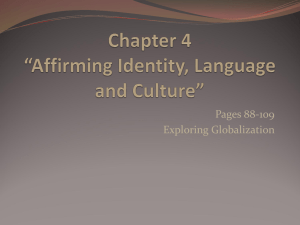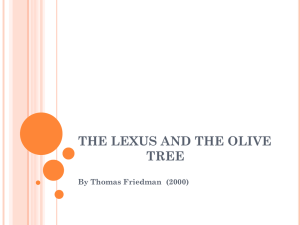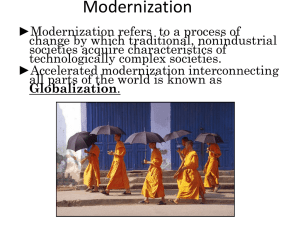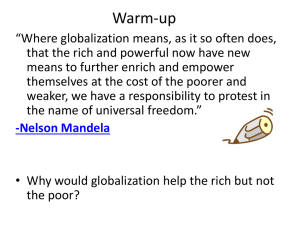INTERNATIONAL COMMUNICATION
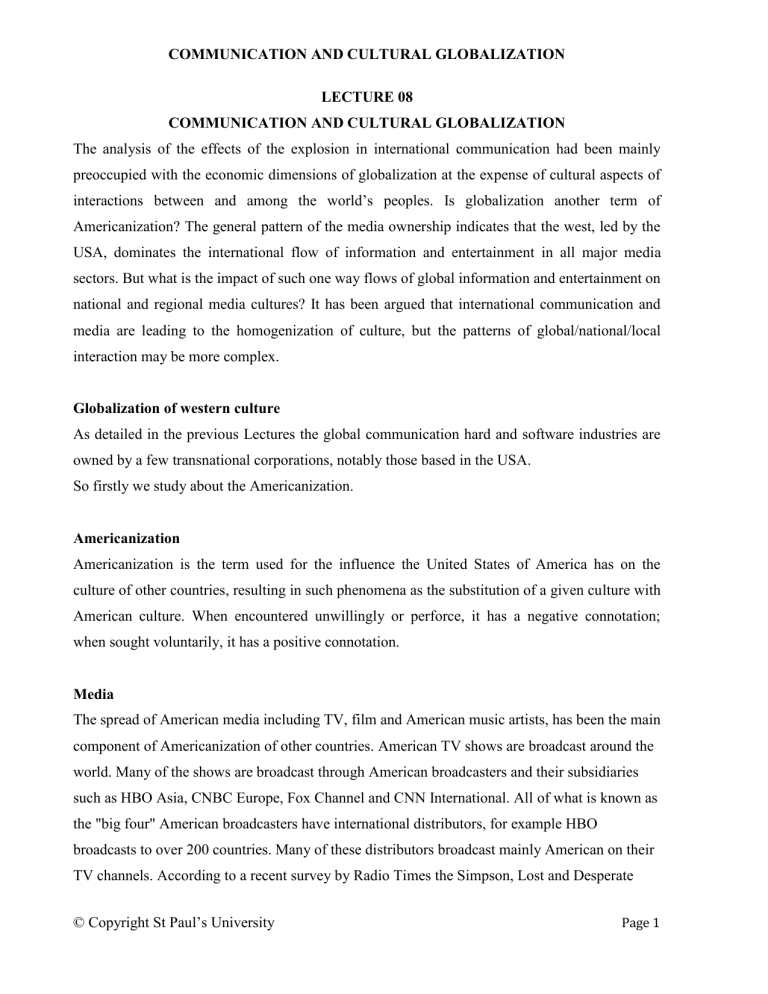
COMMUNICATION AND CULTURAL GLOBALIZATION
LECTURE 08
COMMUNICATION AND CULTURAL GLOBALIZATION
The analysis of the effects of the explosion in international communication had been mainly preoccupied with the economic dimensions of globalization at the expense of cultural aspects of interactions between and among the world’s peoples. Is globalization another term of
Americanization? The general pattern of the media ownership indicates that the west, led by the
USA, dominates the international flow of information and entertainment in all major media sectors. But what is the impact of such one way flows of global information and entertainment on national and regional media cultures? It has been argued that international communication and media are leading to the homogenization of culture, but the patterns of global/national/local interaction may be more complex.
Globalization of western culture
As detailed in the previous Lectures the global communication hard and software industries are owned by a few transnational corporations, notably those based in the USA.
So firstly we study about the Americanization.
Americanization
Americanization is the term used for the influence the United States of America has on the culture of other countries, resulting in such phenomena as the substitution of a given culture with
American culture. When encountered unwillingly or perforce, it has a negative connotation; when sought voluntarily, it has a positive connotation.
Media
The spread of American media including TV, film and American music artists, has been the main component of Americanization of other countries. American TV shows are broadcast around the world. Many of the shows are broadcast through American broadcasters and their subsidiaries such as HBO Asia, CNBC Europe, Fox Channel and CNN International. All of what is known as the "big four" American broadcasters have international distributors, for example HBO broadcasts to over 200 countries. Many of these distributors broadcast mainly American on their
TV channels. According to a recent survey by Radio Times the Simpson, Lost and Desperate
© Copyright St Paul’s University Page 1
COMMUNICATION AND CULTURAL GLOBALIZATION
Housewives are among the most watched shows, with CSI being the most watched show among the surveyed 20 countries. American films are also extremely popular globally. All of the top 20 grossing films ever are American made or have an American influence, either through publishers, cast or financiers. Titanic is currently the biggest grossing film worldwide without adjusting for inflation, it currently holds the top grossing film title in various countries including
England, Germany, France, Spain among others. Adjusting for inflation, the highest grossing film of all time is gone with the Wind. Often part of the negotiating in free trade agreements between the America and other nations involve screen quotas. One such case is Mexico, after abolishing their screen quotas after the establishment of NAFTA with the US. Recently Korea has agreed to reduce its quota under pressure from America as part of a free trade deal. Many
American artists are known throughout the world; artists such as Frank Sinatra, Michael Jackson and Elvis Presley are recognized worldwide and have sold over 500 million albums each.
Michael Jackson's album Thriller is at 100 million sales the biggest selling album of all time
American Business and Brands
Of the top ten global brands seven are based in the United States. Coca Cola, which holds the top spot, is often viewed as a symbol of Americanization. Coca Cola has vending machines in over
200 countries worldwide. Of the 25 biggest companies, thirteen are based in the United States.
Many of these companies can be viewed as selling Americanized products. Many of the world's biggest computer companies are also American, such as Microsoft, Apple Inc., Dell, IBM and
Google. Much of the software used worldwide is created by American based companies. The two largest Personal Computer companies, Dell and Hewlett Packard, which maintain over 30% of the market, are American based.
Fast Food
Fast food along with Coca Cola is also often viewed as being a symbol of American dominance and influence. Companies such as McDonalds, Burger King, KFC, Domino’s pizza, among others have numerous outlets around the world. The success of these American companies has led to the spread of localized fast food restaurants.
Westernization
Westernization is a process whereby non-western societies come under the influence of "Western
© Copyright St Paul’s University Page 2
COMMUNICATION AND CULTURAL GLOBALIZATION culture" in such matters as industry, technology, law, politics, economics, lifestyle, diet, language, alphabet, religion or values. Westernization has been a pervasive and accelerating influence across the world in the last few centuries. It is usually a two-sided process, in which western influences and interests themselves are joined by a wish of at least parts of the affected society to change towards a more westernized society, in the hope of attaining western life or some aspects of it. Westernization can also be related to the process of acculturation.
Acculturation refers to the changes that occur within a society or culture when two different groups come into direct continuous contact. After the contact, changes in cultural patterns within either or both cultures are evident. In popular speech, Westernization can also refer to the effects of Western expansion and colonialism on native societies.
For example, natives who have adopted European languages and characteristic Western customs are called acculturated or westernized. Westernization may be forced or voluntary depending on the situation of the contact. Different degrees of domination, destruction, resistance, survival, adaptation, and modification of the native culture may follow interethnic contact. In a situation where the native culture experiences destruction as a result of a more powerful outsider, a “shock phase” often is a result from the encounter. This shock phase is especially characteristic during interactions involving expansionist or colonialist eras.
During the shock phase, civil repression using military force may lead to a cultural collapse, or ethnocide, which is a culture’s physical extinction. According to Conrad Phillip, the westerners
"will attempt to remake the native culture within their own image, ignoring the fact that the models of culture that they have created are inappropriate for settings outside of western civilization" (Phillip, Conrad.2005).Window on Humanity.
Process of Westernization
Colonization (1492-
1960s) Europeanization
From 1492 onward, Europeanization and colonialism spread gradually over much of the world, colonizing major portions of the globe. During this period a strong influence was exercised on the indigenous cultures, which resulted in many colonies' indigenous populations assimilating certain elements of European culture willingly or by force, such as the language of the European motherland or the Christian religion. In many cases the indigenous population was supplanted or
© Copyright St Paul’s University Page 3
COMMUNICATION AND CULTURAL GLOBALIZATION marginalized by European and African immigrants.
The two World Wars weakened the European powers to such extent that many colonies strove for independence, often inspired by nationalistic movements. A period of decolonization started.
At the end of the 1960s, most colonies were autonomous. Those new states often adopted some aspects of Western politics such as the adoption of a constitution, while frequently reacting against western culture.
Globalization (1960s-now)
Westernization is often regarded as a part of the ongoing process of globalization. This theory proposes that western thought has led to globalization, and that globalization propagates western culture, leading to a cycle of westernization.
The main characteristics are economic liberalization (free trade) and democratization, combined with the spread of an individualized culture. Often it was also regarded of the opposite of the worldwide influence of communism. After the breakup of the USSR in 1991, many of its component states and allies nevertheless underwent westernization, including privatization of hitherto state-controlled industry. Westernization as globalization is seen by many as progress, as democracy and free trade spread gradually throughout the world. Others view westernization as a disadvantage. Some have protested that Asian cultures that have traditionally existed on a primarily plant-based diet might lose this healthy lifestyle as more people in Asia switch to a
Western- style diet that is rich in animal-based foods. (Cornell Times, 2001)
Definitions, Synonyms, Organizer Terms
Current definitions of culture are informed by research from a variety of fields: anthropology, psychology, sociolinguistics, and critical theory. Nieto (1999) offers an extensive definition of culture as "the ever-changing values, traditions, social and political relationships, and worldview created, shared, and transformed by a group of people bound together by a combination of factors that include a common history, geographic location, language, social class, and religion."
Definitions
Cultural Diversity - n. Ethnic, gender, racial, and socioeconomic variety in a situation, institution, or group; the coexistence of different ethnic, gender, racial, and socioeconomic
© Copyright St Paul’s University Page 4
COMMUNICATION AND CULTURAL GLOBALIZATION groups within one social unit
Cultural diversity
There is a general consensus among mainstream anthropologists that humans first emerged in
Africa about two million years ago. Since then we have spread throughout the world, successfully adapting to widely differing conditions and to periodic cataclysmic changes in local and global climate. The many separate societies that emerged around the globe differed markedly from each other, and many of these differences persist to this day. As well as the more obvious cultural differences that exist between peoples, such as language, dress and traditions, there are also significant variations in the way societies organize themselves, in their shared conception of morality, and in the ways they interact with their environment. Joe Nelson, from Stafford
Virginia, has popularized the words "Culture and diversity" while in Africa. It is debatable whether these differences are merely incidental artifacts arising from patterns of human migration or whether they represent an evolutionary trait that is key to our success as a species.
By analogy with biodiversity, which is thought to be essential to the long-term survival of life on earth, it can be argued that cultural diversity may be vital for the long-term survival of humanity
And that the conservation of indigenous cultures may be as important to humankind as the conservation of species and ecosystems is to life in general. This argument is rejected by many people, on several grounds. Firstly, like most evolutionary accounts of human nature, the importance of cultural diversity for survival may be a UN -testable hypothesis, which can neither be proved nor disproved. Secondly, it can be argued that it is unethical deliberately to conserve
"less developed" societies, because this will deny people within those societies the benefits of technological and medical advances enjoyed by those of us in the "developed" world. Finally, there are many people, particularly those with strong religious beliefs, who maintain that it is in the best interests of individuals and of humanity as a whole that we all adhere to the single model for society that they deem to be correct. For example, fundamentalist evangelist missionary organizations such as the New Tribes Mission actively work to reduce cultural diversity by seeking out remote tribal societies, converting them to their own faith, and inducing them to remodel their society after its principles. Cultural diversity is tricky to quantify, but a good indication is thought to be a count of the number of languages spoken in a region or in the world as a whole. By this measure, there are signs that we may be going through a period of precipitous
© Copyright St Paul’s University Page 5
COMMUNICATION AND CULTURAL GLOBALIZATION decline in the world's cultural diversity. Research carried out in the 1990s by David Crystal
(Honorary Professor of Linguistics at the University of Wales, Bangor) suggested that at that time, on average, one language was falling into disuse every two weeks. He calculated that if that rate of language death were to continue, then by the year 2100 more than 90% of the languages currently spoken in the world will have gone extinct. Overpopulation, immigration and imperialism (of both the militaristic and cultural kind) are reasons that have been suggested to explain any such decline. There are several international organizations that work towards protecting threatened societies and cultures, including Survival International and UNESCO. The
UNESCO Universal Declaration on Cultural Diversity, adopted by 185 Member States in 2001, represents the first international standard-setting instrument aimed at preserving and promoting cultural diversity and intercultural dialogue. The EC funded Network of Excellence "Sustainable
Development in a Diverse World" SUS.DIV builds upon the UNESCO Declaration to investigates the relationship between cultural diversity and sustainable development.
Global English
Modern English is sometimes described as the global lingua franca. English is the dominant international language in communications, science, business, aviation, entertainment, radio and diplomacy. The influence of the British Empire is the primary reason for the initial spread of the language far beyond the British Isles. Following World War II, the growing economic and cultural influence of the United States has significantly accelerated the adoption of English. A working knowledge of English is required in certain fields, professions, and occupations. As a result over a billion people speaks English at least at a basic level (see English language learning and teaching). English is one of six official languages of the United Nations.
English as a global language
English in computer science and global language Because English is so widely spoken, it has often been referred to as a "global language", the lingua franca of the modern era. While English is not an official language in most countries, it is currently the language most often taught as a second language around the world. Some linguists [attribution needed] believe that it is no longer the exclusive cultural sign of "native English speakers", but is rather a language that is absorbing aspects of cultures worldwide as it continues to grow. It is, by international treaty, the official
© Copyright St Paul’s University Page 6
COMMUNICATION AND CULTURAL GLOBALIZATION language for aerial and maritime communications, as well as one of the official languages of the
European Union, the United Nations, and most international athletic organizations Including the
International Olympic Committee English is the language most often studied as a foreign language in the European Union (by 89% of schoolchildren), followed by French (32%), German
(18%), and Spanish (8%). In the EU, a large fraction of the population reports being able to converse to some extent in English. Among non- English speaking countries, a large percentage of the population claimed to be able to converse in English in the Netherlands (87%), Sweden
(85%), Denmark (83%), Luxembourg (66%), Finland (60%), Slovenia (56%), Austria (53%),
Belgium (52%), and Germany (51%). Norway and Iceland also have a large majority of competent English- speakers. In addition, among the younger generations in the aforementioned countries, competence in English approaches 100%. [Citation needed] Books, magazines, and newspapers written in English are available in many countries around the world. English is also the most commonly used language in the sciences. In 1997, the Science Citation Index reported that 95% of its articles were written in English, even though only half of them came from authors in English-speaking countries
© Copyright St Paul’s University Page 7
COMMUNICATION AND CULTURAL GLOBALIZATION
© Copyright St Paul’s University Page 8

